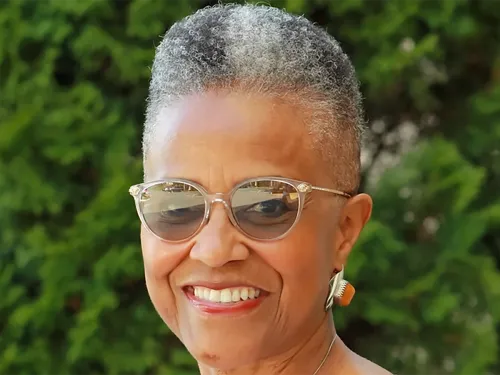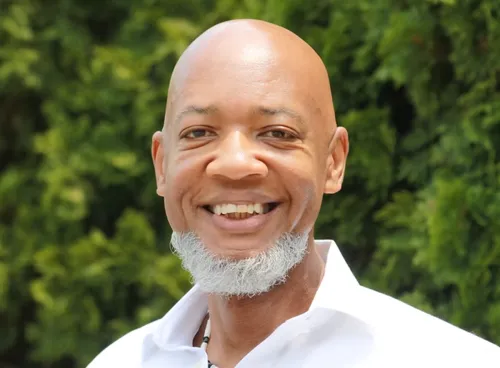Johnson C. Smith Theological Seminary invites people to ‘Exhale’
Online community meets Monday evening to speak, listen and support one another amongst political upheaval

LOUISVILLE — On Monday, a day that doubled as Inauguration Day and the day honoring the transformative work of the Rev. Dr. Martin Luther King Jr., Johnson C. Smith Theological Seminary gave those gathered via Zoom for an event called “Exhale” an opportunity to voice their hopes and their fears and to be reminded they’re not alone.
“What we know and believe at JCSTS is tonight is an opportunity for connection,” said Cheryl Scales, the seminary’s strategist and marketing coordinator. “For me, the word for today is ‘persevere,’ because I must.”
The 30 or so attendees broke into small groups to discuss:
- What is your armor in this season?
- What tools are you using?
- What tools are you missing? What tools are needed for such a time as this?
One participant said she’s using joy and faith as armor, and the tool she’s seeking is hope. “The first time around, I showed up at every protest there was with my full self,” this participant said. “I don’t know if I have it in me again.”
“I’m leaning on God’s peace. Even though we may not see it, God is working,” said another. “It gives me hope to know I am not by myself.” For this participant, the most important question is, “What is God trying to show us through this? You cannot overcome love. When I communicate in love, the devil doesn’t know what to do.”
A third says she puts on “the armor of curiosity” and “tries to take off judgment.”

“I think I need to grow more courage,” this participant said. “Those of us who are not necessarily activists but are active need to not assume someone else is doing it.”
The Rev. Dr. Deb Mullen, Principal Program Associate at JCSTS, said we can indeed “do two things at the same time.” A pause such as the one offered by the Exhale gathering “is opening space to be able to take in the fullness of what the Spirit is calling for, then figure out the way the Spirit is leading,” Mullen said.
“I’m scared of not knowing what to do, and I’m scared of being scared,” one participant said, adding she’s seeking to build trust this year, “that I really am held in the hands of God and who I am is already enough,” she said. We can present an offering “just by showing up and influencing those I am closest to.”
Mullen thanked her for naming her fear in the face of political upheaval. “It is not wise not to pay attention to that,” Mullen said. “We have been so conditioned in our privileged society that we believe all we need is ourselves, our thoughts and our resources. I wonder if part of the crisis brought on by Covid has awakened in us the awareness we really do need each other? Where do we talk about fear?”
“The fear I relate to is the fear that we are not going to do enough in these moments,” one participant said. “I think that’s palpable.”
“It really does help to find communities like this,” Mullen replied, “where one can speak about their fear in such a way that it allows everyone else to say, ‘I am feeling the same thing and here is what I’m afraid of.’”
When the entire group reformed, JCSTS’ president, the Rev. Paul Roberts, said he’s grateful for “your energy, your vulnerability, your deep passion in the pursuit of justice and your understanding of the intersectionality of faith and justice.”

He read aloud Jeremiah 29:1-4, the prophet’s challenging letter to the exiles in Babylon. “It’s an amazing, troubling passage,” Roberts said. “Somewhere in there I hear an implication to go with the flow, to get on board, and I find that really disturbing. At the same time, I resonate with what it must have felt like for those Israelites to be in exile. I have felt like an exile in the country of my own residence, and many of you do too.”
The ”word from the Lord all those years ago was to plant gardens, build houses, and grow and eat the food that you grow,” Roberts said. “‘Seek the welfare of the city’ suggests to me that it’s really important, even in these complex times, to engage, to be in community, to live as abundantly as we can, because when we seek human flourishing, we all flourish.”
“That is not to say we should not resist,” Roberts said. “It is to say that in seeking the flourishing of the city, the search, the passion, the commitment to flourishing is, in its own way, an act of resistance.”
Seeking the city’s welfare so we’ll find our own welfare “is tough to do,” one participant responded, when the new administration “will take us places I and a lot of others don’t want to go. But the truth is, that’s our call.”
“As complex and complicated as it is,” Roberts said, “that’s our call.”
Especially in portions of the Old Testament, “there is an eschatological hope that is a common thread,” Roberts said. When we hear assurances like Jeremiah’s promise of return, “it’s very much part of the theological formation of the community at the time.” Roberts said it’s important “to understand that in our political and theological context.”
“I’ve got plans for you,” one participant said, quoting God indirectly through the prophet. “That’s a very comforting thought tonight.”
Another voiced a need for “a clear expectation of the risks of what we may be called to do. It may be something that puts our reputation, our livelihood or our life at risk. We need to decide whether we’re ready to do that, trusting that God will be with us.”
“I think we need to be wise as serpents,” this participant said, “about our resistance and decide how far we’re going to go.”
The gathering concluded with a recording of The Spirituals performing “Wade in the Water.”
Learn more about Exhale gatherings here.
You may freely reuse and distribute this article in its entirety for non-commercial purposes in any medium. Please include author attribution, photography credits, and a link to the original article. This work is licensed under a Creative Commons Attribution-NonCommercial-NoDeratives 4.0 International License.




